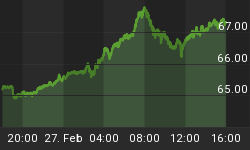Markets are driven by a process of collective thought. After all it is your own mind that makes the decision whether or not to buy or sell. Since most markets are traded by crowds of people, it becomes true that the collective sum of the group's thought process is behind the market trend. Take a look at the picture in the bottom right hand corner. What do you see? Some may see the busy little bodies toiling about their average day, perhaps helping to build a castle. Others may take a broader view and see the castle in the shape of a deathly skull. So which one is it? Are the little people helping construct one of their grandest castles? Or are they constructing their deathly doom? Indeed, this single picture can characterize the actions of policy makers worldwide, including the U.S. But it's all a matter of opinion. Highly subjective opinion. Take for example the recent announcement by S&P to put America's rating on a "negative outlook". Most commentators and traders concluded, rightly or wrongly, that this is a net negative development for the United States.

But I was interested to read this quote from a market participant at a major U.S. bank.
"I'm not sure why the S&P negative watch on the U.S. government is a negative for U.S. stocks. I get it if an actual downgrade or default happened,.. borrowing costs go up across the board. But if there is a 1 in 3 chance they [politicians] don't get their act together, there is a 2 in 3 chance they do."
That is, this participant sees a 2 in 3 chance that the U.S. government begins to balance its books provided in the commentary of S&P's revision as better than the current "negative outlook" stamped by the same revision. A different view to market consensus.
Japan: Up Or Down?
Was the March 11 disaster good for Japan or bad for Japan? There has been much debate about the ramifications of the Earthquake-Tsunami-Radiation disaster for Japan. Some commentators believe that this event will hurt Japanese exports, that this is the straw that breaks the camel's back, especially when piled on top of a record debt to gdp ratio. Here is one an extract from the Huffington Post after Japan's disaster: "The disaster in Japan threatens to significantly impede the nation's economic recovery, perhaps spreading to other nations." They went on to say: "Amid the massive devastation, experts see two emerging threats to the Japanese economy: the domestic power supply could be compromised, and manufacturing companies could be unable to export products". http://www.huffingtonpost.com/2011/03/15/japan-earthquake-economy_n_835874.html
But Barron's magazine had a different take on the outcome of the disaster. They felt strongly bullish about it, enough to run a front page cover with "BUY JAPAN NOW" in big and bold. "Over the longer term, the disaster could actually add to economic growth as Japan spends money to rebuild the devastated areas, which account for 7% of Japan's economy and a large part of its land mass". Furthermore, they went on to say: "The market looks cheap," says Seiichiro Iwasawa, chief strategist at Nomura Securities. After last week's selloff, "the market is discounting that next fiscal year's earnings will decline by 20%. I would say that in the worst case, earnings growth will be zero. There is a big distance between this scenario and the one I presume. I think it's a buying opportunity."
http://online.barrons.com/article/SB50001424052970203757604576204523501069008.html#articleTabs_panel_article%3D3
Either way you look at it, you can get a different picture from a different perspective. And it doesn't matter what the underlying truth of the matter is. What matters is price action and your resultant risk management. This is what matters most to traders.
Subjective Trading
Today the S&P500 Index trades at 1312. We are still 15% off the all time highs, yet we have rallied over 100% since the March 2009 low. How do you perceive the market? Is it bullish because of a hyperinflationary threat, or are you bullish because you believe in fundamental growth in U.S. economy? Are you bearish because the "rally has gone too far" or are you a deflationist? Are commodity prices strengthening because of a recovering economy or is it the result of quantitative easing? No one knows the future for sure, but experience and insightful research helps improve the accuracy rate over time. Moreover, when it comes to trading the price action, our TBT Trend Model ensures that sticking to a well defined mechanical system helps in removing the bias in subjective opinion. Researching trends is the most challenging part of the job and one that remains a fundamental aspect of any trader's job. It is correctly understanding the fundamentals that allows you the confidence to stick with a trend in the trading system. Understanding the fundamentals allows you to distinguish between an impulsive market movement or a messy correction.
Stay with us as we provide you with our most accurate interpretation of market trends in upcoming issues.















